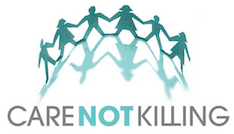Care Not Killing welcomes Court ruling rejecting assisted suicide

Care Not Killing has welcomed the latest rejection of a legal challenge to the UK's assisted suicide laws by campaigner Phil Newby.
Mr Newby, 49, from Rutland, was diagnosed with Motor Neurone Disease in 2014 and cannot use his hand and lower arms. He said he faces an "inhumane and intolerable' deterioration as the disease progresses. He raised £42,000 for the legal challenge calling for people to be able to choose "a civilised ending" to their lives.
But judges in the High Court said "the court is not an appropriate forum for the discussion of the sanctity of life."
Lord Justice Irwin, sitting with Mrs Justice May, said: "it is impossible not to have very great sympathy for this situation in which Mr Newby finds himself. His clear and dignified statement compels admiration and respect."
Mr Newby's lawyers said he will appeal against the court's decision.
Dr Gordon Macdonald, Chief Executive of Care Not Killing, commented: "We welcome this decision by the Courts to reject the attempt to change the 1961 Suicide Act and introduce assisted suicide via the backdoor. As the ruling points out this is a matter for Parliament, not for judges.
"This ruling recognises that Parliamentarians across the UK continue to reject attempts to introduce assisted suicide and euthanasia - more than a dozen times since 2003 - out of concern for public safety, including in 2015 when the House of Commons overwhelmingly voted against any change in the law by 330 votes to 118. The current laws prohibiting assisted suicide and euthanasia do not need changing.
"It recognises the significant dangers of ripping up long held universal protections, that ensures the law treats all people equally and evidence from around the world confirms removing these protections puts vulnerable people at risk of abuse and of coming under pressure to end their lives prematurely.
"Just a few week ago a major US report from the National Council on Disability, found the laws in the handful of States that had gone down this route, were ineffective and oversight of abuse and mistakes was absent.
"This was a highly significant and important report as those championing assisted suicide, like DiD, (formally the Voluntary Euthanasia Society), hold up Oregon and Washington as the model for making the change in England and Wales.
"These findings resonate with other official reports that show year after year, a majority of those ending their lives in both States cite fear of becoming a burden a reason.
"There are also problem outside these US states. In 2016, Canada changed their law to allow terminally ill people to request assisted suicide and euthanasia. In just three years the numbers of those dying this way has dramatically risen, with one Canadian academic reported a four-fold increase between 2016 and 2018, from 1,010 - 4235.
"Then in September, the Quebec Superior Court struck down the requirement that a person be terminally ill before they qualify for euthanasia in Canada.
"While in July a depressed, but otherwise healthy 61-year-old man, was euthanised in the province of British Columbia. Alan Nichols, a former school janitor who lived alone, had struggled with depression, was admitted to Chilliwack General Hospital, BC, in June after he was found dehydrated and malnourished. Despite not being terminally ill, he received a lethal injection. Alan's case is not isolated.
"There are a growing numbers of reports that terminally ill patients and those with chronic conditions are being denied care, but offered the drugs to kill themselves. In one such case, Roger Foley from Ontario who suffers from a neurological disease, recorded hospital staff offering him a 'medically assisted death', despite his repeated statements that he did not want to die and wanted to return to his home.
"No wonder not a single doctors group or major disability rights organisation supports changing the law, including the British Medical Association, the Royal College of General Practitioners, the Royal College of Physicians, the British Geriatric Society and the Association for Palliative Medicine."
If you are affected by any details in this report, and would like to talk to someone, the Samaritans are available 24 hours a day see: www.samaritans.org/


















